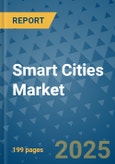Market Insights
The adoption of smart city frameworks is being accelerated by the dual imperatives of sustainability and efficiency. Governments and private stakeholders are investing heavily in integrated infrastructure, harnessing data analytics, AI, IoT, and 5G networks to optimize service delivery. From intelligent transport systems and energy grids to e-governance platforms and connected healthcare, smart city solutions are no longer experimental-they are becoming essential components of urban policy. The smart cities market is also witnessing diversification in service offerings, including consulting, integration, deployment, and security, ensuring adaptability to varied regional and local priorities.Market Drivers
Several pivotal drivers are underpinning the expansion of the smart cities market:
1. Urbanization at Unprecedented Scale - With more than 65% of the global population expected to live in urban areas by 2050, smart city adoption has become indispensable to avoid congestion, pollution, and strained resources.2. Sustainability Commitments - Climate change targets and carbon-neutrality goals are pushing governments and industries to deploy energy-efficient solutions, renewable integration, and green mobility.
3. Technological Advancements - Continuous innovation in IoT devices, AI-powered analytics, 5G networks, and cloud computing is enabling seamless interconnectivity and real-time urban management.
4. Public Safety and Security Needs - Rising concerns over cyber threats, crime rates, and natural disasters are fueling investments in smart surveillance, predictive policing, and disaster management systems.
5. Government Initiatives and Funding - Large-scale government programs, such as smart city missions in India, EU’s Horizon projects, and U.S. federal infrastructure investments, are creating fertile ground for industry growth.
Business Opportunity
The smart cities landscape is a hotbed of opportunities for technology providers, infrastructure developers, and service consultants. With demand spanning smart energy grids, intelligent transport, water management, connected healthcare, and digital governance, the sector offers lucrative avenues across both developed and emerging markets. Service providers offering consulting, system integration, cybersecurity, and AI-driven analytics are positioned to capitalize on rising demand for seamless and secure deployment. Additionally, software vendors offering advanced data management and smart lighting solutions are witnessing expanding adoption in both residential and industrial ecosystems.Regional Analysis
- North America is anticipated to lead the market through 2032, driven by strong adoption of advanced technologies, government-backed infrastructure modernization, and a growing emphasis on sustainability. The U.S. in particular is spearheading smart grid, mobility, and healthcare projects.
- Europe continues to demonstrate strong momentum, supported by the EU’s emphasis on green urbanization, carbon neutrality by 2050, and stringent environmental regulations. Germany, the U.K., and France are frontrunners in deploying smart transportation and energy solutions.
- Asia Pacific is emerging as the fastest-growing region, led by China, India, Japan, and South Korea, where urbanization rates are among the highest globally. Massive government investments in digital infrastructure, combined with rapid technology adoption, are fueling the regional boom.
- Latin America is progressively adopting smart city frameworks in areas such as public safety, transportation, and governance, with Brazil and Mexico leading the charge.
- Middle East & Africa is gaining traction with smart city projects in the Gulf states, notably the UAE’s initiatives such as NEOM in Saudi Arabia and Dubai’s smart government vision. These projects underscore the region’s drive to diversify economies and improve quality of life through innovation.
Key Players
The smart cities ecosystem is shaped by a mix of technology giants, infrastructure leaders, and service specialists. Prominent players include:
- Microsoft Corp.
- AT&T Inc.
- Huawei Technologies Co. Ltd.
- Hitachi Ltd.
- Siemens AG
- Schneider Electric SE
- IBM Corporation
- Cisco Systems, Inc.
- ABB Ltd.
- Accenture plc
- General Electric Company
- Intel Corporation
- Itron, Inc.
- Ericsson
- SAP SE
Segmentation
By Component
- Software
- Smart Metering Software
- Smart Lighting Software
- Data Management Software
- Other
- Smart Sensors
- Smart Cameras
- Smart Meters
- Network Devices
- Others
- Hardware
- Services
- Consulting Service
- Support & Maintenance
- Integration & Deployment
- Security Services
By Application
- Smart Security
- Smart Building
- Smart Transportation
- Smart Governance
- Smart Energy
- Smart Healthcare
- Smart Water Network System
- Smart Education
- Others
By Region
- North America
- Europe
- Asia Pacific
- Latin America
- Middle East & Africa
This product will be delivered within 1-3 business days.
Table of Contents
Companies Mentioned
- Microsoft Corp.
- AT&T Inc.
- Huawei Technologies Co. Ltd.
- Hitachi Ltd.
- Siemens AG
- Schneider Electric SE
- IBM Corporation
- Cisco Systems, Inc.
- ABB Ltd.
- Accenture plc
- General Electric Company
- Intel Corporation
- Itron, Inc.
- Ericsson
- SAP SE








